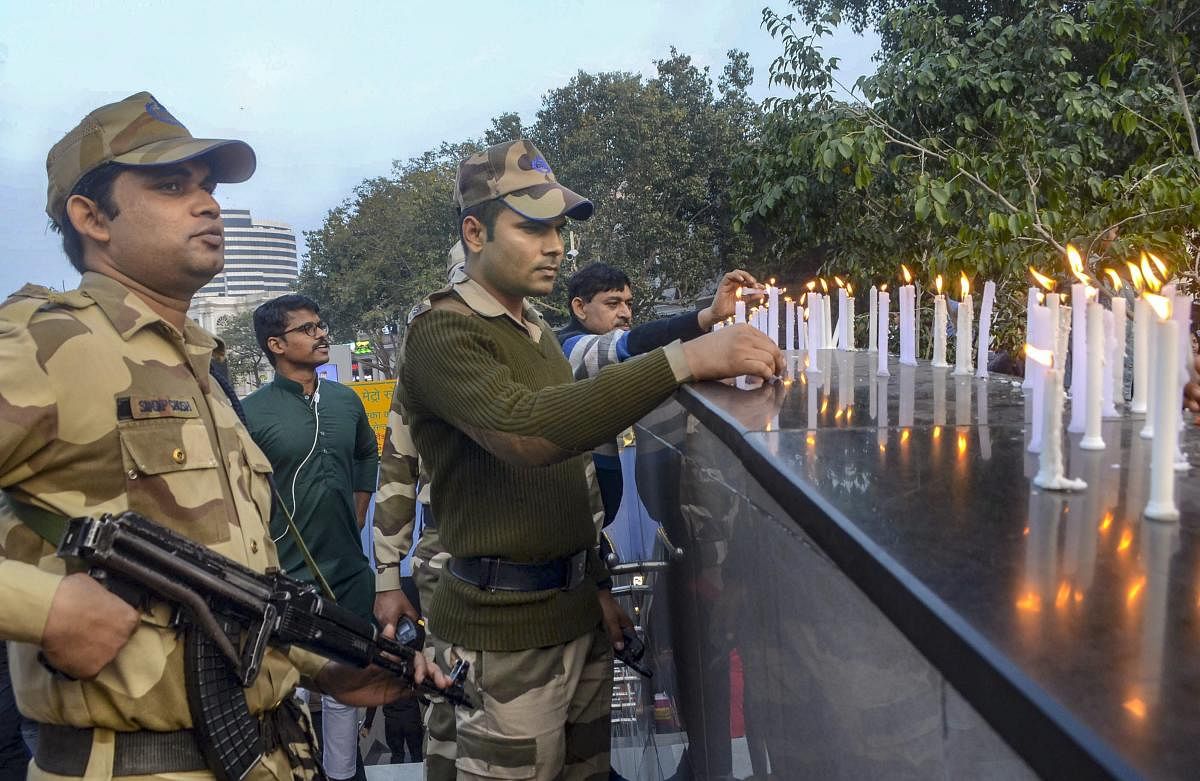
The February 14 JeM-sponsored suicide car-bomb attack on the CRPF convoy, with loss of over 40 lives and as many injured, is condemnable.
The electronic media broke the news with attempts to lay the blame on some slip-up at some level. Television anchors interviewed “experts” — this writer was one such — whether the Pulwama carnage was due to “intelligence failure”, and whether the attack would have been possible if intelligence was timely and correct. One needs to know that even with timely intelligence reports, militant attacks can succeed, because of several factors on the ground. Security forces (state police, Central Armed Police Forces and Indian Army) routinely conduct inquiries to learn lessons, to refine their standard operating procedures (SOP), and to assign blame where necessary.
When the militant chooses the target, time, place, method and intensity of attack, he has the double advantage of initiative and surprise. Thus, the security forces, even with rigorously practiced SOPs, are almost always reactive. Unless the intelligence was used to successfully prevent or pre-empt the attack, apart from strictly adhering to SOPs, the security forces cannot act until the militant launches the attack, and therefore often suffer casualties.
Further, especially in a suicide attack, the attacker has no care for his life, thus multiplying the elements of initiative and surprise. The effectiveness of the attack, measured by the number of casualties “achieved” and the extent of damage, is the concern of his handlers. Thus, journalists engaging in blame game (“is it an intelligence failure?”) does nothing to assuage the grief of bereaved families or solve any problem. What it does is to take the viewers’ mind off bigger failures at higher levels of governance.
Militant forces with inferior striking power avoid direct armed confrontation with trained, superiorly-armed and equipped government security forces. As individuals, militants are usually courageous, although their courage is for purposes unacceptable to our society. To put a finer point on it, the words “cowardly” or “dastardly”, routinely used by TV anchors, politicians and others to describe the attacks or attackers are incorrect. No attacker in his right mind (not even regular forces in combat, and least of all militants) would “bravely” announce his attack. The problem with using these pejoratives is that it serves to distract the public from the reality of the causes of militancy and failures of governments and governance over the decades.
The way forward
Every Indian recognises the hand of the Pakistani government and Pakistan Army in planning, facilitating and encouraging such attacks. While the involvement of Jaish-e-Mohammad leader Masood Azhar in the present and earlier attacks is beyond question and bringing him to justice is necessary, this cannot be more than just a minor step in solving the decades-long, on-going problems in Kashmir. Clearly, more needs to be done than routinely threatening Pakistan with severe retribution.
Continuous deployment of security forces over decades, to the exclusion of good governance imperatives, has done little or nothing to solve the problem which is fundamentally socio-political in nature. The civil unrest and militancy is the result of decades of less-than-honest politics by successive governments in the state and at the Centre, which have obdurately viewed it as a law and order problem to be handled by security forces. The problem has grown over the decades and resulted in formation and growth of multiple militant/terrorist organisations.
The Pulwama suicide attacker is stated to be a teenager named Adil Ahmed. Though this is only the most recent event, it indicates the increasing alienation, especially of the younger generation, among the people of Kashmir from the Indian mainstream.
Without discounting the role of security forces in Kashmir or discontinuing their deployment, good governance needs to be given the highest priority and importance, with security forces used only as a subsidiary and not as the primary instrument, as has been the practice so far.
Following the Pulwama attack, media reported that an emergency CCS (cabinet committee on security) meeting discussed the future course of action. This writer respectfully submits that the apex security body needs to focus on strategy and policy and political measures, and should leave action plans to the heads of the security forces.
The National Security Council (NSC) was established in November 1998. Its members are the prime minister and union ministers for defence, home, external affairs and finance. It is meant to advise government on matters of national security and strategic interest. But even after 20 years, successive governments upto the present one, have not publicly stated their strategic vision or framework policies to address the problems of security and, in particular, Kashmir’s civil unrest and militancy problem, or at least they have not placed it before Parliament. Strategic vision and framework policies are not secrets of State and cannot be treated as such, being matters too serious to be left to a small coterie of politicians.
Beyond the immediate
The Government of India would be well advised to state its medium-term and long-term policies as a part of its strategic vision, and make these available in the public domain. These should include:
• Leaving it to the discretion of the Indian Army measures like “surgical strikes” as retaliation against cross-border attacks and militant/terrorist infiltration, and not politicising these measures
• Measures to bring political, economic and diplomatic pressure on Pakistan and initiate bilateral talks at multiple levels
• Initiating talks with people’s organisations, including militant organisations, in Kashmir as a beginning for public-confidence-building measures
• Reducing deployment of security forces in step with the growth of people’s confidence in the intentions, performance and results of good governance
• Encouraging people-to-people contact between India and Pakistan in the larger interest of peace in the sub-continent, and
• Taking diplomatic initiatives with other neighbours, towards improving internal security situation in Kashmir.